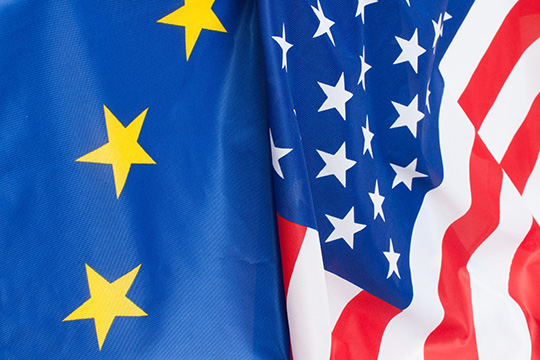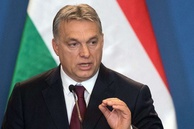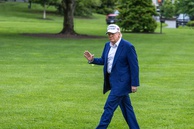Speaking at a December 4 news conference in Brussels following a two-day meeting of NATO foreign ministers, US Secretary of State Michael Pompeo said that the rule-based multilateral world order that for many decades has served the collective interests of the Western nations is no longer working. He backed up this claim by citing the weakness and incapacity of the United Nations, the Organization of American States, the African Union and some other international organizations. [i]
Much to the Europeans’ surprise, while holding up the NATO alliance as an “indispensable” institution, Pompeo also put the European Union on the list of outdated and unviable ones. These “shocking” comments wrapped up the past 12-month period, probably the most tense in trans-Atlantic relations since 1945.
By the start of 2018, relations between the US and the EU were characterized by a great deal of uncertainty. On the one hand, in the US National Security Doctrine [ii] published in mid-December 2017, Trump finally reiterated Washington’s commitment to Article 5 of the North Atlantic (Washington) Treaty, which is something Europeans had been waiting for. He also promised to support America’s European allies against the imaginary “threat” from Russia and China, which he described as "revisionist countries" out to change the existing world order.
On the other hand,the USNational Security Council’s view of the countries’ competition in the world conforms to Hobbes’ “all against all” principle. [iii] In other words, it rejects the idea of multilateralism, which is a fundamental principle the countries of “old” Europe stick to. Moreover, the entire world order that the US helped establish after 1945, is described as the source of a flurry of serious challenges to America. The Strategy section, devoted to the “world of universal competition,” makes no mention whatsoever of America’s “allies,” while the repeated mention of the obligatory "mutual benefit" of allied relations looks like an undisguised desire to "monetize" friendship.
Washington’s practical steps made in 2017 left Europeans wondering about the price (in the financial sense of the word) Trump would expect them to pay for honoring America’s trans-Atlantic obligations. As a result, Europe was torn between the desire by a sizeable part of its establishment to retain the US leadership [iv], even at the cost of far-going concessions, and a growing disillusionment with the policy of its overseas partner.
The past year confirmed the Europeans’ worst fears: the world, according to Donald Trump, is a world without global rules, a world where the strongest always comes out on top. The White House acted as if it viewed the European Union not so much an ally, as a competitor to fight with. In the spring, Trump suggested to the French President Emmanuel Macron that he pull France out of the European Union in return for a lucrative bilateral trade deal with the US. [v]
Trump supported the UK’s exit from the EU, and even threatened the British Prime Minister Theresa May with economic "measures" in the event of a "softer" Brexit. On June 1, Trump imposed duties on steel and aluminum imports from Europe and threatened to slap new ones – this time on imported European autos.
During the G7 summit in Canada in June, President Trump tried to drive a wedge between the Europeans. Finally, during the NATO summit in July, Trump made it clear that if Europeans refused to “cooperate,” Washington could roll back its military support and even withdraw the US military contingent from Germany. Washington has also made it clear that he considers any further EU foot-dragging on defense spending hikes as a deliberate policy by Europeans, who view the United States as an unfailing guarantor of their security.
During the first half of 2018, the Europeans openly pushed back against Trump’s insistence that his G7 or NATO partners accept the dramatic change in Washington’s approach to these pillars of the Western world, their goals and objectives.
The emergence of Donald Trump has exposed the “royal nudity” of the European Union, which has not yet outlined a common foreign policy on major tracks, or come up with anything in terms of strengthening its power in order to be able to stand up to Washington’s demands. [vi]
On the other hand, the heavy-handed and self-serving US policy is too inconsistent as it tries to win over only the partners it can rely on in its fight against Chinese and Russian “revisionism.”
And still, watching the growing signs of US hostility, Europeans start asking themselves a virtually existential question, and that is where the current US Administration is going? Is this the beginning of a long-term trend, a fundamental change in US strategy, or a tactical zigzag meant to achieve some short-term goals? If it is the latter, just like it happened before, then will it be enough to just “wait it out”? If it is the former, will the EU opt for strategic autonomy as part of an increasingly amorphous, but civilizationally homogeneous West, or will it have to solve the colossal task of creating a full-fledged European "power center” that would interact with the US, mainly, if not exclusively, on the principles of "Realpolitik"?
At the same time, a “wait-and-see” tactic could backfire against Europeans. On the other hand, the “all-strops-out” trade war between the US and China, which broke out last year, is forcing the EU to perform a balancing act, maneuvering its way between the world’s two largest economies. This necessitates an independent geo-economic policy in the face of a looming global economic recession. The long-term challenge to Europe is to build a new, previously unknown, system of international architecture: “economic bipolarity between the United States and China and strategic bipolarity between the United States and Russia.”
Experts believe that if Europeans want to push back against Washington’s plans and avoid the EU’s fragmentation, they should start thinking about making Europe stronger, and do it now. [vii]
By mid-2018, more and more European politicians had realized that, in the wake of the Cold War, Washington’s policy in Europe was aimed at undermining Europe’s global competitiveness. The question is, however, to what extent the American establishment as a whole shares Trump’s stated goal of maintaining or increasing America’s dominance, even at the cost of economically destroying the “allies,” who are now being perceived by Washington as competitors.
Trump's initiatives are clearly aimed against the very idea of European unity, which fuels European suspicions about his desire to implement the classic “divide and rule policy” in Europe.
Having all these factors in mind, the EU’s overarching task was to work out measures to resist Trump’s four-pronged “geopolitical attack” in trade, defense, on Iran [viii] and migration policy. On June 6, the European Commission approved €2.8 billion worth of import duties on US-made goods. Following the July visit to Washington by the European Commission President Jean-Claude Juncker, the Europeans achieved at least a semblance of a “truce” in their trade relations with the US. Surprisingly to many, the reconciliation had a demonstrative, even flashy character. After meeting Juncker, Trump said that the US was putting on hold the planned introduction of new tariffs on imported European goods, and would work to settle existing trade disputes in order to avoid a full-scale trade war.
According to experts, Europeans have no wish at all to share with the US the burden of a new economic slump, which Trump’s “reckless” protectionism may entail. Therefore, the EU could best respond to Trump’s policy by assuming the role of the leader of countries committed to preserving the rules of liberalism in international trade. The EU’s economic potential matches that of the United States and its economy is almost the only area of international relations where the bloc can act on a par with, or even independently, from Washington.
However, even though unable to compete economically with the US on a one-to-one basis, EU members remain divided on many issues. Fully aware of this, Donald Trump uses every opportunity available to try to pit them against one another. [ix]
So, capitalizing on Europeans’ discord over migration, Trump has banked on unraveling the traditional European political parties by mixing all the trends. Newly-appointed US ambassadors openly support far-right populist parties in Italy, Germany, Britain, and in Central Europe. [x]
Meanwhile, the traditional European parties are preparing to challenge Eurosceptics in the upcoming elections to the European Parliament, set for May 2019. Internationally, the EU responds by ramping up diplomacy aimed at cobbling together coalitions without the US in a bid to preserve the existing world order. In July 2018, the EU and Japan agreed to set up a free trade zone; Brussels has likewise been intensifying efforts to establish a free trade area also with MERCOSUR, Australia and New Zealand, and is actively engaged in informal efforts aimed at promoting liberal values and institutions.
The EU’s stance concerning the US sanctions on Iran, has been equally firm, prohibiting companies and individuals located on the territory of the EU from following American sanctions against Iran. According to the new EU rules, European firms hurt by US sanctions will be able to demand compensation. Brussels also reiterated its commitment to the 2015 nuclear deal with Iran, and is actively looking for ways to circumvent US financial hegemony and sanctions. The EU is mulling an independent system of financial settlements, the European Monetary Fund - an analogue of the IMF - as well as financial instruments that would be "completely independent" from Washington. However, ensuring even a simple majority of “yes” votes by individual EU members on these issues will not be easy.
The biggest hurdle here is security, because without the United States, NATO as a military organization becomes virtually ineffective making Europe hostage to America when it comes to security. This effectively weakens the EU’s hand even on the continent, let alone the world. The European NATO members face the hard choice of either playing the role of US-led partners, which may imply their agreement to weaken European unity to benefit Washington’s new foreign policy interests, or stay the course of greater independence, including in matters of collective defense (European army), which, however, is fraught with a great deal of uncertainty.
With the onset of autumn, the issue of “European sovereignty” sprang to the top of the EU leaders’ agenda. At the end of August 2018, the French President Macron and the German Foreign Minister Maas went on record emphasizing the need for Europe to play a new role and “strengthen” its position in the global alignment of forcesemerging in the world. In early November, Macron and the German Chancellor Merkel reiterated their call for a "European army,” "real pan-European armed forces." Moreover, the US was named among the threats Europe needs to defend against. [xi]
During the past year, Europe was making mainly tactical steps aimed at making up for the damage caused by US sanctions. Simultaneously, it was actively looking for a future strategy of trans-Atlantic relations, as well as ways for institutionalizing its independent identity, both in foreign policy and defense.
There is little doubt that all of Europe will not turn its back on America, even though most of the countries of “old” Western Europe have been seeking greater “strategic autonomy” for the EU and a system that could function without relying on the hegemonic might of the United States. By contrast, many Central and East European states are making every effort to strengthen ties, above all military, with Washington, so Europe is still wondering how it can possibly to preserve the “old order.”
The outcome of the November 2018 mid-term elections in the US showed that American voters were losing faith in Donald Trump’s way of handling the country’s foreign policy and foreign trade. With Democrats regaining control of the lower chamber of Congress – the House of Representatives – Trump may need a positive foreign policy agenda, and what better way to achieve this than to restore constructive relations with traditional allies and negotiate with the Europeans? Including on joint measures to “contain” Russia.
Simultaneously, the notion, whereby the EU project is on the brink of collapse and so the US needs to present NATO as a new unifier of Europe is getting increasingly popular in the United States. This is the idea that was pitched late last year by none other than US Secretary of State Mike Pompeo.
This could pull the rug from under the feet of not only those who seek Europe’s strategic autonomy, but even the advocates of a more centralized EU. Therefore, the question of whether the leading European countries will go beyond pacifying voters with talk about the creation of an “independent center of power” remains open. And further moves by the EU in relations with the United States, at least until the May elections to the European Parliament and the change of leadership of the European Commission, will largely depend on Washington’s policy towards its European allies.
The opinion of the author may not necessarily reflect the position of the Editorial Bpard.
[i] https://foreignpolicy.com/2018/12/07/pompeos-speech-in-brussels-was-tone-deaf-and-arrogant
[ii] https://www.whitehouse.gov/wp-content/uploads/2017/12/NSS-Final-12-18-2017-0905.pdf
[iii] https://www.cfr.org/blog/trump-national-security-strategy
[iv] http://svop.ru/wp-content/uploads/2017/07/report_miller_lukyanov_rus_2.pdf
[v] https://www.newsru.com/world/29jun2018/trump_macron.html
[vi] https://www.inopressa.ru/article/27Jun2018/lefigaro/trump_eu.html
[vii] https://www.inopressa.ru/article/07Jun2018/lemonde/eu.html
[viii] On May 8, 2018 the US exited the Iran nuclear deal, and in November reinstated full-blown sanctions against Tehran. Washington also threatens to sanction European companies maintaining business ties with the Islamic Republic.
[ix] https://www.inopressa.ru/article/25Jul2018/spiegel/eu_trump2.html
[x] https://www.inopressa.ru/article/08Aug2018/lemonde/eu.html
[xi] https://p.dw.com/p/387Yq (Deutsche Welle)
read more in our Telegram-channel https://t.me/The_International_Affairs

 11:37 14.01.2019 •
11:37 14.01.2019 •



























